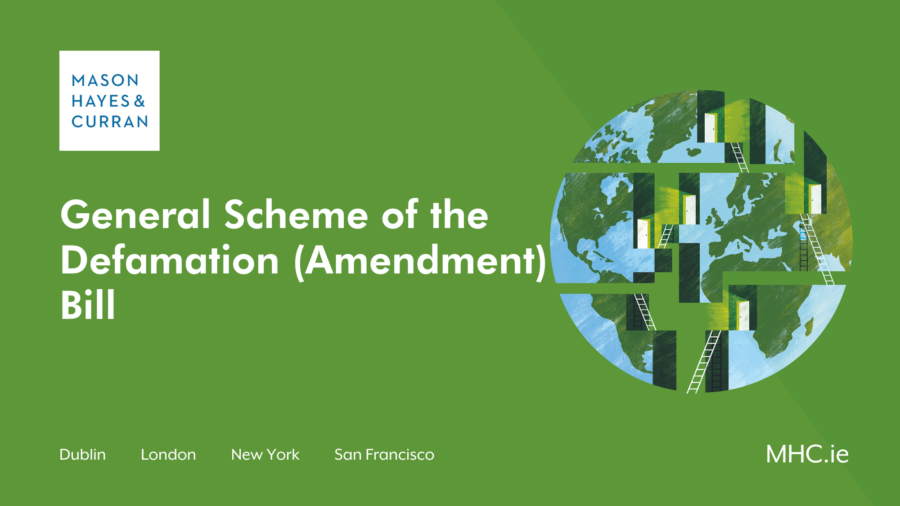
Following the Report of the Review of the Defamation Act 2009, which was published last year, the Minister for Justice has recently published the General Scheme of the Defamation (Amendment) Bill. While not yet binding law, this marks a significant development in the modernisation of defamation law in Ireland and seeks to address some persistent criticisms of the current system.
The text of the General Scheme can be accessed here.
The 2022 Report
The aim of the 2022 Report of the Review of the Defamation Act 2009 (2022 Report), was to ensure that the right to freedom of expression be balanced appropriately with the right to protection of a person’s good name and the right of access to justice. The 2022 Report was based on wide-ranging public consultation and a stakeholder conference that brought together:
- The media
- Academics
- The legal profession
- NGOs, and
- Relevant State bodies
The 2022 Report took into account many issues raised by submissions to the public consultation. It also considered reforms which have been put in place at EU level and in other common law countries. The 2022 Report then concluded that reforms were necessary to:
- Avoid excessively large awards of damages, and support more predictable redress in defamation cases
- Ensure that wrongfully defamed persons have better, more timely access to justice, including in cases of online defamation
- Provide better protection for responsible public interest journalism and investigative reporting
- Significantly reduce unnecessary legal costs and delays, and
- Increase the use of alternative dispute resolution, and of prompt correction and apology, where mistakes are made
The General Scheme
The General Scheme of the Defamation (Amendment) Bill considered the recommendations of the 2022 Report and provides for such reforms as:
- Abolishing juries in High Court defamation actions
- Publication of a correction with equal prominence to the defamatory publication
- Provision for the lodging of an offer of settlement in court which will be taken into account in determining costs
- Provisions to address the issue of ‘libel tourism’ which require that the court must be satisfied that of all the places in which the statement complained of has been published, Ireland is clearly the most appropriate place in which to bring an action in relation to that statement
- Reforming of the defence of ‘fair and reasonable publication’ on a matter of public interest to make it simpler and clearer
- Providing that if a contributor unexpectedly makes a defamatory comment during a live broadcast, the broadcaster will have a defence provided it can show it took reasonable measures before and during the broadcast to prevent defamatory comments being made
- Providing for the insertion of a new Part into the Act to deal with strategic lawsuits against public participation (SLAPPS), and
- Creating a new statutory power for the Circuit Court to make a ‘Norwich Pharmacal’ order, making such orders less costly and more accessible. These orders direct an intermediary service provider to provide information identifying an anonymous owner and operator of an account, author or poster of a defamatory statement. Currently, such orders are only granted by the High Court.
Notice of Complaints – online intermediaries
Of significant interest is that the General Scheme provides for a statutory Notice of Complaint process which changes the obligations of intermediary service providers when handling complaints regarding defamatory content. The requirements under Head 34 of the General Scheme set out in further detail the mechanism which is provided for under Article 16 of the Digital Services Regulation. If this is enacted, online intermediaries may have to review their takedown procedures for defamatory content to ensure compliance with the new law. For example, the General Scheme indicates a period of five working days within which to acknowledge receipt of the complaint. A further five days are provided for to forward the Notice of Complaint to the author of the statement. If no response is received from the author, access to the statement must be restricted or disabled within five days of confirming receipt of the Notice of Complaint. Additionally, if the author cannot be contacted for some reason, access to the statement must also be restricted or disabled. This mechanism could represent a significant and more pro-complainant change for online defamation complaints.
Conclusion
As this legislation is a General Scheme, it remains very much in draft form. It is also interesting to note that there have been two Defamation (Amendment) Bills produced by the Government in the last 10 years. However, neither ever made it to enactment. Some critics will condemn the removal of juries in High Court actions and would suggest that perhaps clearer guidelines and directions to juries would be more appropriate. The introduction of the Notice of Complaint mechanism for online intermediaries represents a significant change in how online defamation complaints may have to be dealt with by social media companies.
It remains to be seen whether the Defamation (Amendment) Act will be enacted and we will be keeping a close eye out for further updates on the progression of this legislation.
For more information and expert advice, please contact a member of our Intellectual Property team.
The content of this article is provided for information purposes only and does not constitute legal or other advice.




